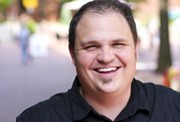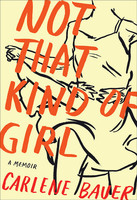Winn Collier’s relationship with Relevant Magazine goes back as far as mine does. We both were early members of their freelance writing stable. But while I was writing silly stuff about twenty-something life and the apocalypse (occasionally in the same piece), Winn was already being wise and pastoral. He was Relevant’s Deeper Walk editor for five years. He’s also written for Leadership Journal, PreachingToday.com, and other notable publications.
 Moreover, Winn is the author of three books that overlap with many of the things that keep coming up in O Me of Little Faith and on this blog. His first solo book, Restless Faith: Hanging on to a God Just out of Reach, is a candid look at Winn’s struggles to know a mysterious, unknowable God. Let God is an exploration of the work of the 17th century theologian Francois Fenelon, whose letters and wisdom Winn paraphrases. And his newest book, Holy Curiosity: Encountering Jesus’ Provocative Questions, takes a look at the probing, subversive questions Jesus asks in the Gospels.
Moreover, Winn is the author of three books that overlap with many of the things that keep coming up in O Me of Little Faith and on this blog. His first solo book, Restless Faith: Hanging on to a God Just out of Reach, is a candid look at Winn’s struggles to know a mysterious, unknowable God. Let God is an exploration of the work of the 17th century theologian Francois Fenelon, whose letters and wisdom Winn paraphrases. And his newest book, Holy Curiosity: Encountering Jesus’ Provocative Questions, takes a look at the probing, subversive questions Jesus asks in the Gospels.
Winn is the pastor at All Souls Church in Charlottesville, Virginia, and the director of The Genesis Project, a support community for church planters.
Here’s his contribution to Voices of Doubt series. It’s called “Doubt Better.”
—————-
A pastor really ought to believe in God. It usually works better that way.
Unfortunately,
I possess a skeptical bent, so nagging questions have been familiar
space. Usually, these vexing concerns pass after a short stretch. About
six years ago, however, the question of whether or not God existed sat
down for a visit. And decided to stay for a while.
Added
to the fatigue and heaviness I experienced during this grueling
doubting season (maybe 15 months or so), I felt shame that I was a
hypocrite, espousing a faith that perhaps I didn’t actually believe.
They do say you’re supposed to smoke what you’re selling.
Commonly,
doubters receive advice to go to the Scriptures and see if doubts
dissipate. I followed the recommendation; however, what I discovered was
not a way out of doubt but a way into it. The Bible taught me how to
doubt better.
What I discovered in Scripture,
particularly the Psalms, was instruction in how to speak to God,
language for Divine conversation. What I found most striking was the
Psalms’ brutal honesty. Whatever one felt toward God, they spoke
(actually, prayed): anger, joy, ambivalence, fear, delight. And doubt.
The
Psalms suggest that dishonesty may be the only thing that isn’t prayer.
If we are filled with doubt, the Bible suggests we doubt out loud.
Doubt to God. Don’t hold back. Don’t try to slash a smiley face across
it. Let it loose. Doubt louder. Doubt better.
Because
doubt is uncomfortable to us (and unwelcome by others), giving voice to
doubt can be a courageous, honest act — a faithful act. Doubt can be an
expression of faith.
We often view faith as fragile. So
we think we need to tiptoe, to tone down our questions. What if our
faith can’t stand up to all these uncertainties? If our faith can be
slapped around, perhaps it needs to be. Doubt happens when our
assumptions or expectations are upended; and truth is that some of our
assumptions and expectations (and beliefs) need to be upended. My boys
believe I’m stronger than the Hulk. Soon enough, that belief will
shatter.
I’ve come to believe that true faith is sturdy.
It can handle its own battles. Faith doesn’t need me to defend it;
faith only needs me to be honest.
This honest posture
points toward another shade of what it means for me to doubt better. At
times, what I’ve called doubt is actually cynicism. When I express
doubt, I’m brutally honest with my struggle and my hesitation — but I’m
still engaged, still in the conversation. However, when I’m cynical, I’m
withdrawing, hiding and protecting myself from having to trust
anything. Cynicism is the easy way.
To doubt well is to
doubt our doubts as much as we doubt our faith. It’s the sentiment
shared on a t-shirt my wife Miska gave me: “I have my doubts about
disbelief.” Doubt keeps us moving, keeps us from settling for clichés
(religious clichés or secular clichés). “Doubt is the ants in the pants
of faith,” says Buechner.
How Christians ever came to
the place where we’ve earned the reputation as those who are quickest to
shut down our minds befuddles me. If God is true, we have nothing to
fear. Stretch our minds. Go wide-open. See if the things we’ve professed
have any heft or if they’re all cultural or psychological smoke and
mirrors. If God is true, he isn’t quivering over our intellectual
hiccups. He really isn’t.
And if God isn’t true, then we ought to find out, sooner the better.
Flannery
O’Conner describes this kind of practice. “What kept me a skeptic in
college was precisely my Christian faith. It always said: wait, don’t
bite on this, get a wider picture, continue to read.” For O’Conner,
doubt was a spiritual discipline. She learned to doubt well. We might
take her cue.
—————-
Thank you, Winn. You can find Winn on Twitter and Facebook. Learn more about his books and check out his blog at winncollier.com.
• Tyler Clark on Losing Fear, Losing Faith
• Rob Stennett on the Genesis of Doubt
• Adam Ellis on Hoping That It’s True
• Nicole Wick on Breaking Up with God
• Anna Broadway on Doubt and Marriage

